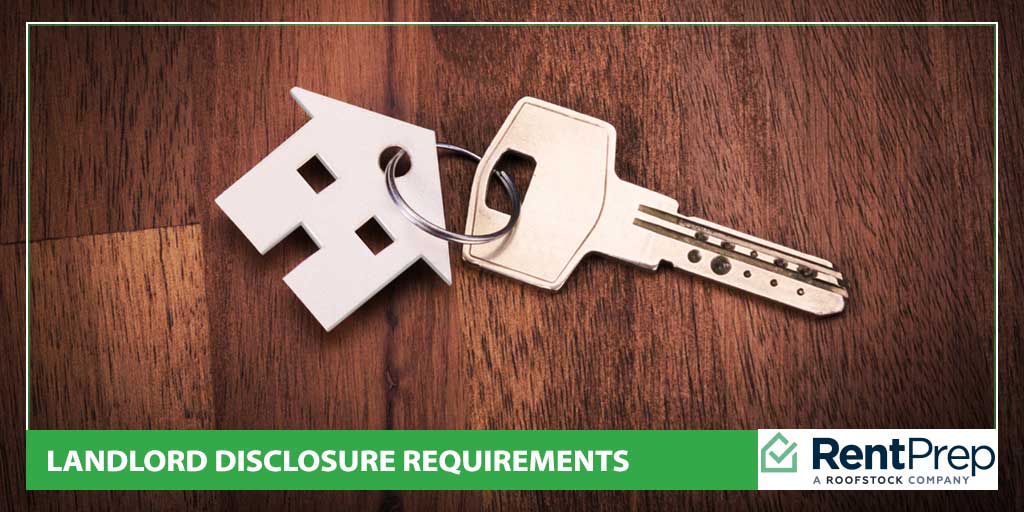
You know you’re responsible for meeting certain standards as a landlord, but did you also know that you’re responsible for specific landlord disclosure requirements when renting to a new tenant?
Landlord disclosure agreements are an essential part of every lease. Failure to provide these disclosures means you could be sued by a tenant or otherwise have your business affected in a severe way.
What disclosures are necessary in your state, and why is it essential to ensure these pamphlets and informational documents are correctly delivered? Learn all that you need to know about required disclosures today.
A Table Of Contents About Landlord Disclosure Requirements
Tenants must be alerted about issues affecting their health or desire to rent a property. From flooding to lead paint to pests, many unknown facts may need to be revealed to tenants. Here’s what you need to know:
- What Are Landlord Disclosure Requirements?
- Landlord Disclosures: What You Must Tell Tenants
- State-Specific Disclosure Information
- FAQs: More On Landlord Disclosure Requirements
- What is a landlord required to provide to new tenants?
- What happens if a landlord does not disclose the necessary information?
- Where can a landlord be reported if they are not following the necessary disclosure protocol?
- What must be included in a lead disclosure statement?
- Can inspections for required disclosures be refused by a tenant or landlord?
- Don’t Skimp On Disclosures
What Are Landlord Disclosure Requirements?

Local, state, and federal laws require landlords to inform tenants of certain information. These are known as landlord disclosure requirements. If landlords do not provide tenants with the required information before moving in, they can face fines and penalties that will affect their business.
Most of the time, simply including a copy of the disclosure information with the lease or as a section of the lease is enough. In some cases, state law requires specific language to be used or a particular pamphlet to be handed out to tenants. These documents are usually found on the state’s website.
Landlord Disclosures: What You Must Tell Tenants
Disclosures will vary from state to state and property to property. Some disclosures only apply if a certain product was used in the building; others must be given out regardless of the building’s construction.
Lead Paint
There is only one nationwide disclosure tenants must receive when renting an applicable property: the lead paint disclosure.
Federal law requires that most buildings constructed before 1978 are rented only after informing tenants of lead paint risk. These tenants must be provided with pamphlets and forms to ensure they understand what lead paint is and what harm it can cause.
If any previous inspections have been done on the property to check for lead paint, the results should also be included with the disclosure. This includes lead paint that has been abated and removed from the property.
Common State Disclosures
Every state has different disclosure requirements, but some standard disclosures show up in many states across the country:
- Security deposit disclosure detailing amount, collection, storage, interest, and return
- Existing damage disclosure via a move-in inspection or checklist
- Disclosure of how to access applicable landlord-tenant law
- Registered sexual offender disclosure
- Flood or fire risk disclosure
- Safety disclosure on escape routes, sprinkler systems, and other safety measures
- Environmental hazard disclosures for mold, radon, or bed bugs
- Smoking policy disclosure
- Domestic victim violence rights disclosure
State-Specific Disclosure Information

As mentioned, much of the disclosure law you need to be aware of as a landlord is determined at the state level. This means you should research the statues in your area. We’ve gathered statutes from some of the most landlord-heavy states as examples of the type of state laws you may come across.
California (CA)
California statutes exemplify depth and information when it comes to disclosures. More disclosures appear here than in many other states, which can overwhelm some landlords.
These are some of the primary disclosures landlords must provide in the state:
Sexual Offender Database
Landlords must include specific language in their lease agreements about where tenants can find information on registered sex offenders in the state. This enables tenants to see if there are offenders in the area and informs them of how to go about that lookup.
Utility Allocation
Landlords must disclose if the utility fees will go toward other rental units or common areas and how the allocation will occur if applicable.
Toxic Mold Disclosure
Prospective, current, and future tenants must be told if there is any known toxic mold in dangerous amounts within the building. Additionally, all landlords must provide prospective tenants with a pamphlet from the state about the risks of mold.
Pest Control Services
Any landlord utilizing pest service treatments must disclose the type and reason for treatment, and the active ingredients used in the treatment. Additionally, they must share the risks of pesticides as outlined by the state.
Additional Disclosures
Additional disclosures apply under California law, including flood disclosure, bed bug disclosure, and even a provision about disclosing any deaths on the property in the last three years. California landlords have a lot to keep track of when generating disclosures.
New York (NY)
The disclosures in New York aren’t as thorough as those in California, but landlords in New York City will have a few additional local ordinances to follow.
Some of the common disclosures seen alongside New York leases include:
- A certificate of occupancy provided or displayed to prove the property is fit for residential use
- Lease sprinkler disclosure if it exists and when it was last serviced
- Complete list of move-in inspection items after lease signing, if requested by the tenant
- Bedbug disclosure form (New York City only)
Texas (TX)
Two primary disclosures must be made to tenants in Texas.
First, Texas law requires that landlords disclose how much is withheld from their security deposit and why it was kept, alongside detailed information about the expenses. The landlord faces hefty fines and fees if this isn’t done within 30 days of move-out.
Texas law also requires landlords to identify themselves in the lease agreement. Your name and address, as well as the full name and address of any representing management firms, must be included. This ensures the tenant is fully aware of who is in charge of the property.
Virginia (VA)
Virginia landlord disclosures include the following:
- Move-in checklist detailing the condition of the property
- Identifying information for the landlord and any authorized property managers acting on their behalf
- Any evidence of mold at the property
- Statement of tenant rights and responsibilities
If any of these forms are not correctly given to the tenant, the landlord cannot evict the tenant until these disclosures are properly processed.
Florida (FL)
The state laws in Florida are similar to those already covered. Like Texas and Virginia, Florida landlords and their authorized agents must have their full name and address disclosed to the tenant for identification purposes. Also, landlords must disclose information about fire safety and security deposit returns in their leases.
One unique disclosure in Florida is a radon disclosure. Radon is a naturally occurring gas found in some buildingsa. If it builds up in high quantities or someone is exposed to radon for an extended period, it can cause health problems. A warning about radon must be included in all leases alongside information about radon testing.
Get Ahead On Preparing Required Documents
It’s difficult to prepare all necessary documentation when working as a landlord, and adding disclosure forms feels like too much for many landlords. There are many things to write and prepare, from applications to lease agreements.
Here at RentPrep, we know how hard it can be to keep up with all that paperwork, and that’s why we created our Landlord Form Bundle. This mega pack of forms is designed for landlords to quickly adjust and complete for their business needs. Check out the bundle today.
FAQs: More On Landlord Disclosure Requirements
What is a landlord required to provide to new tenants?
As you know, part of your responsibility as a landlord is to provide your tenants with a clean, habitable dwelling. You must upkeep this property reasonably and follow all other aspects of your lease agreement.
Beyond your general responsibilities as a landlord when it comes to physical upkeep, you are also legally required to disclose specific information to your tenant before they move in. These disclosures include lead-based paint, pest control information, safety concerns under construction, and other essential information.
These disclosures are required. Not providing them can lead to big problems and significant fines, so be sure to research what disclosures are required in your state.
What happens if a landlord does not disclose the necessary information?
There are severe consequences if you do not adequately disclose necessary information to tenants. Some states require monetary compensation; others leave the punishment to a judge in small claims court.
If disclosure laws in your area list specific penalties, you will incur these penalties if you do not properly disclose information to your tenant. You may have to pay specific fines, and you can even lose your landlord license if applicable in your state.
At the federal level, landlords face fines of up to $16,000 per violation if they do not comply with federal lead paint disclosure requirements. First-time violators are typically given a written warning, but repeat offenders can be civilly and criminally charged.
Disclosure statutes in some states hold landlords responsible for actual damages caused by their negligence. For example, tenants who aren’t told they will have to pay for common area utilities will be reimbursed for the actual cost if the landlord is declared negligent.
Where can a landlord be reported if they are not following the necessary disclosure protocol?
If tenants feel you are not doing your job as a landlord, they can report you to federal or state organizations. Every state has representative bodies, and the type of issue the tenant has will determine where the report goes.
The best way to avoid being reported is to always keep a professional and open line of communication available to your tenants. This will give them space to air any grievances with you so that you can address their concerns or explain why you have taken a given action. It is impossible to ban or prevent tenants from reporting complaints, but you can help avoid them feeling they have anything to complain about.
What must be included in a lead disclosure statement?
Lead disclosure statements must include all relevant information that is known about the property. If you’re positive that there are areas of lead-based paint or hazards at the property, the tenant must be alerted to these facts.
Also, landlords should provide a lead-based paint informational pamphlet from federal organizations. This pamphlet, which should be given at all properties with confirmed or potential lead-based paint, covers essential information for tenants occupying the space.
Can inspections for required disclosures be refused by a tenant or landlord?
While tenants are permitted to refuse an inspection when there is an issue of convenience after they move in, tenants cannot deny an inspection occurring before they move in. Similarly, landlords who include, or are required to include, an inspection before move-in cannot block it from happening.
Ideally, both parties will be happy with an inspection occurring before move-in day arrives. A move-in inspection will identify potential problems and set the lease up for success. Without it, it will be impossible for a landlord to resolve outstanding issues or provide an accurate disclosure to the tenant. Both parties should work to make it happen.
Don’t Skimp On Disclosures
As frustrating as it can be to produce additional documentation when renting a property, it’s essential not to skip any of the necessary disclosures. Skipping a required disclosure leads to financial distress and potential court cases. There’s no reason to take that type of risk.
To simplify the process of supplying disclosures, create a disclosure folder for each property alongside your leases. Putting them in a single folder will make it easier to handle each time you rent a property. You may need to include the following:
- Lead paint disclosure
- Pest control disclosure
- Email/text information disclosure
- Flooding disclosure
Don’t forget to review your state and local laws to ensure there are no additional statutes that affect disclosures. Then, get your disclosures ready. Having them in advance will save you time, money, and energy in the long run.

